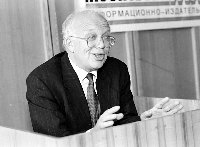Belated but Still Relevant Memoirs

An atmosphere of tender emotions and gratitude reigned at the presentation ceremony in Kyiv, attended by the grandson and other former General Secretary relatives of the who came from Moscow. Some of the present history-related scholarly elite were so seized with nostalgia that the room heard occasional odes in praise of the "fighter for a sovereign Ukraine." Sometimes, however, allowance was made for his contradictory image. Professor Volodymyr Serhiychuk noted Ernst Neizvestny's sculpture which conveyed Mr. Khrushchev's nature very true to life by alternating white and black colors.
Questions were mainly addressed to Khrushchev's son Sergei (photo). He called himself an "advocate of the Soviet Union." Answering The Day's question about the degree of democracy in Russia's present-day regime, Sergei Khrushchev said: "We live today under the same system. Gorbachev took a step toward democracy, but now Russia is backsliding."
A story told by a well-known human-rights fighter Semen Hluzman was
by far the brightest point of the function: "quiet city madman" Stepan
Soroka once lived in Kyiv. He meddled in all things of our life. And then
General Secretary Khrushchev arrived in the city. All Kyiv was humming:
the Secretary must be guarded by a regiment of soldiers, so no one could
even approach him. And here Stepan decided to put in his nickel's worth:
"it's a piece of cake to deal with Khrushchev if you really wish and know
how to do it..." The next day Soroka himself was dealt with, getting a
25-year prison camp term for an attempt on the General Secretary's life.
Hluzman met in those same camps. And it was via Hluzman that Soroka sent
out a wish that flowers be laid on the grave of the already deceased Khrushchev
from a man who had never dreamed of killing him. For he is nothing but
a "quiet city madman," still alive, by the way.
Выпуск газеты №:
№18, (1999)Section
Culture





